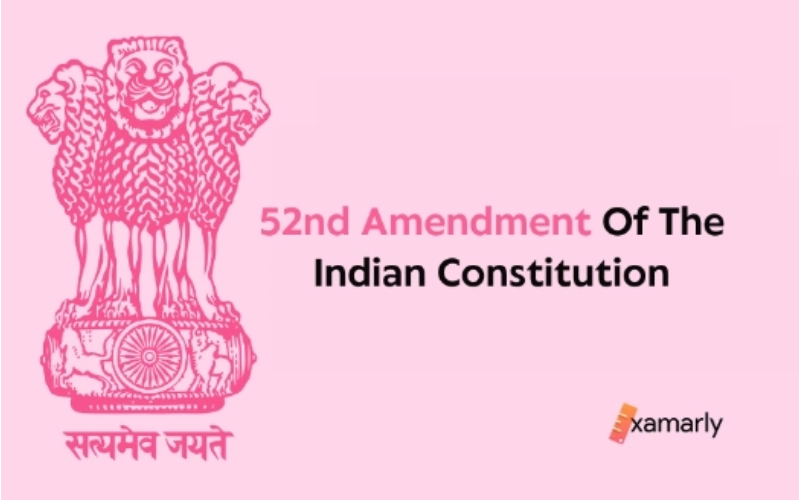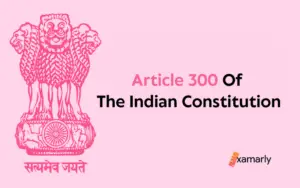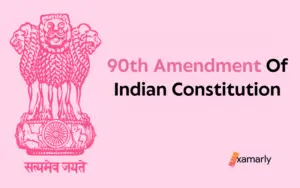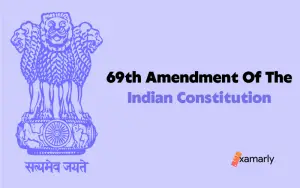The 52nd amendment of the Indian Constitution came into effect in the year 1985. It was introduced as an anti-defection bill in the parliament to prohibit its members from hopping between different political parties.
- Anti-Defection Law
- Salient Features and Facts
- Date Enacted
- Statement of Objects and Reasons
- Prominent People Involved
- Important Provisions
- Conclusion
- FAQs related to the 52nd Amendment of the Indian Constitution
- 1) When 52nd Amendment Of the Indian Constitution introduced?
- 2) When was the anti-defection act enacted?
- 3) Who introduced the 52nd Amendment of the Indian Constitution?
- 4) Does the 52nd Amendment of the Indian Constitution consider disqualification on grounds of a split, merger, or both?
- 5) Is the 52nd Amendment of the Indian Constitution applicable to the House of Parliament or state legislature or both?
Anti-Defection Law
India is a socially and geographically diverse country. To maintain equality and unity, India adopted a multi-party system in which multiple (more than two) political parties compete for government formation.
Every candidate for election has their lure of office, personal motive, and attraction for material benefits. Political parties leverage this fact by offering executive office, money, and other benefits for their agendas. It led to frequent defections or incidents of defections in the Parliament, State legislative assemblies, and councils.
To deal with this, the Fifty-second amendment act brought in the Anti-Defection Law or the tenth schedule of the constitution that lays down the ground of defection and disqualification of defectors basis such grounds.
Salient Features and Facts
The 52nd amendment of the Indian constitution inserted a new Schedule in the constitution i.e. the 10th schedule. It altered the provisions of Articles 101, 102, 191, and 192. It laid down the grounds of defection for members of either house of Parliament or state assemblies or councils.
India is a democratic country and defection by legislators occurs in almost every democracy. The major aspect of defection is the personal gain that the members are lured into. Though some of the personal motives are fulfilled, the sole beneficiary of defections is the political parties.
Anti-defection law or the Tenth schedule call for disqualification on grounds of:
- If an elected member of the House of Parliament or State Legislature voluntarily gives up her/his membership in the same political party he was elected from.
- If the elected member of the House of Parliament or State Legislature goes against the party whip.
- If any member, elected independently, joins any political party.
- If a nominated member of the House joins any political party after the expiry of six months from the date he took his seat.
Anti-defection legislation, 1985 in its provisions for disqualification states that if one-third of elected members of a political party defect and join any other party then that would be considered a merger, and the 10th schedule won’t be applicable in such cases. (The one-third fraction was changed to two-thirds members by the 91st constitutional amendment act 2003).
Decision on disqualification questions will be referred to the Chairman or Speaker of such House. The law does not specify any time limit within which the presiding officer showing his nonpartisan role needs to decide on defection cases. The decision of the Speaker in case of disqualification of MPs is subject to judicial review.
Date Enacted
The Fifty-second amendment act was enacted on 15 February 1985.
Statement of Objects and Reasons
The 52nd amendment of the Indian Constitution aims to prevent political defections for reasons of office and other considerations from causing harm to democracy. Its proposed solution is to bar Members of Parliament and State Legislatures who deviate from party politics from continuing to hold their political office.
The 52nd Amendment of the Indian Constitution was not passed without a major change in the country’s political landscape. Nevertheless, it is the highest-level document drafted by our democracy and has the potential to make Indian politics more transparent.
Aside from enhancing political freedoms, this amendment also contains provisions to curb corruption. The constitution’s anti-defection provisions were a result of a series of debates over the issue.
Prominent People Involved
Though not directly involved in this amendment, Anti-defection law is often recalled by the phrase Aaya Ram Gaya Ram after the Haryana MLA Gaya Lal changed his political party thrice on the same day in 1967.
The Anti-Defection legislation bill was tabled in the Parliament by A.K Sen.
Also read – 53rd amendment of the Indian constitution
Important Provisions
The introduction of the tenth schedule is the major change brought about by the Anti-defection legislation or the anti-defection act. It was then used to alter certain sub-clauses in Articles 102,190 and 191.
Article 102:-
- deals with grounds for disqualification of the members of either House of Parliament. These are –
- a member holding any office of profit under the Government of India
- member is of unsound mind
- member is an undischarged insolvent
- member is not a citizen of India
- disqualified by any law made by Parliament
- Member is disqualified under the Tenth schedule.
Articles 190 and 191 deal with the vacation of seats and disqualification on grounds mentioned above (office of profit, unsound mind, undischarged insolvent, citizenship clause, tenth schedule) for members of the house of the legislature of a state and council.
Conclusion
Anti-Defection Law or the 52nd constitutional amendment act laid the rules to tackle political party defection or rather the growing politics of defection. As such no major amendment to the articles was done in this amendment. The courts gave the tenth schedule a go-ahead as it did not hamper the basic structure of the constitution.
Love for the power of administration and other benefits plays a key role in these cases.
Though the amendment did streamline the process, many loopholes remain to be tackled. The future through a coalition government, the nonpartisan role of the speaker, and no timeframe for the presiding officer to adjudge the cases are some of the issues left to be resolved.
FAQs related to the 52nd Amendment of the Indian Constitution
1) When 52nd Amendment Of the Indian Constitution introduced?
The 52nd Amendment of the Indian Constitution was introduced on 23rd January 1985.
2) When was the anti-defection act enacted?
It was enacted on 15th February 1985.
3) Who introduced the 52nd Amendment of the Indian Constitution?
The 52nd amendment of the Indian constitution was introduced by A.K Sen.
4) Does the 52nd Amendment of the Indian Constitution consider disqualification on grounds of a split, merger, or both?
The 52nd Amendment of the Indian Constitution only considers the merger of political parties as an exception to the disqualification grounds and not a split.
5) Is the 52nd Amendment of the Indian Constitution applicable to the House of Parliament or state legislature or both?
Yes, the 52nd Amendment of the Indian Constitution applies to both the parliament and state legislature.






